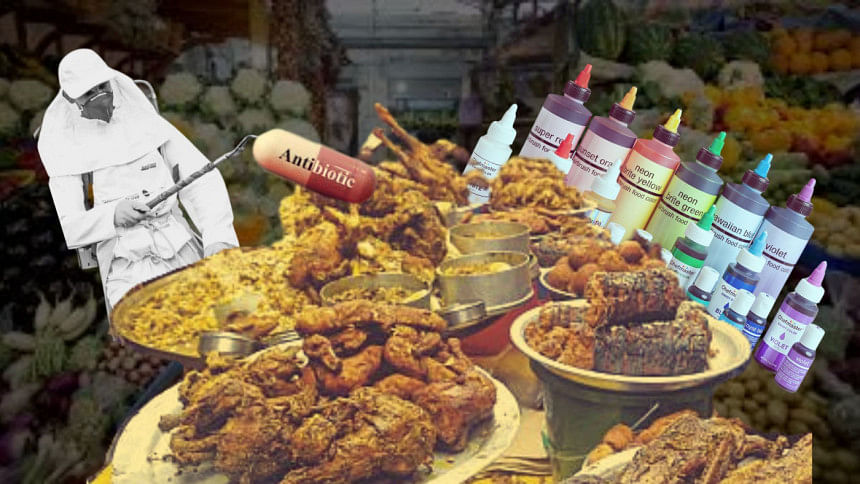Bangladesh’s GMO buffet: Eat first, ask questions never

In most parts of the world, the phrase "you are what you eat" is taken as a serious motivation for health. In Bangladesh, we take it as a threat to that very health. Because if anyone ever dared to analyse what exactly we're eating, they'd need not a nutritionist, but a toxicologist—and possibly a full-blown epidemiology team.
Welcome to the country, where food regulation is treated like an optional seasoning: nice to have, but not really essential. While other countries spend years developing policies before genetically modified organisms (GMOs) hit the shelves, we prefer the chaos-first, consequences-later model. Why worry about food safety when you can serve a science experiment gone rogue with a side of rice?
Let's begin with GMOs. Yes, Bangladesh was the first country in South Asia to commercially release a genetically modified food crop: Bt brinjal, rolled out in 2013 with all the subtlety of a government-sponsored watch party. No mass sensitisation. No warning labels. No meaningful consumer consent. Just "Here, take this magic seed. Don't ask questions. Smile for the Ministry of Agriculture."
Since then, we've been flirting with golden rice, GM potatoes, and whatever Frankenstein crop is next on the donor-funded wishlist. And still—still—there's no mandatory GMO labelling. In most countries, consumers have the right to know if their tomato was edited in a lab, that too edited more than a lot of women's Instagram pictures. In Bangladesh, we believe in destiny. What's meant for you—be it pesticide resistance or organ failure—will find its way.
Then there's our poultry. Oh, our beloved broiler chicken—the lifeblood of morog pulao, the protein of the proletariat. Except now it's less chicken and more biological anomaly. These birds grow from chick to full-on bodybuilder in six weeks flat, thanks to a mind-bending cocktail of steroids, antibiotics, and hormones. The result? Meat so plump and juicy it could be a Marvel superhero.
Now, growth enhancers aren't inherently evil. In regulated contexts, they help meet protein demand. But the keyword is regulated, and in Bangladesh, food safety regulations are about as well-enforced as traffic laws on an Eid holiday.
Bangladesh has no national law clearly banning the use of growth hormones in poultry. A 2014 High Court order directed the government to curb their use—but enforcement? Meh. The Department of Livestock occasionally stages media-friendly raids and "seizes" some chickens, and then we all go back to business as usual. Meanwhile, illegal feed additives and veterinary drugs are sold openly like candy in the markets.
According to the Bangladesh Food Safety Authority, a significant percentage of poultry farms use antibiotics improperly, including those meant for humans because the cramped, unhygienic conditions are a breeding ground for disease. So instead of cleaning up their farms, producers clean up the symptoms—by turning every chicken into a walking pharmaceutical.
And as if things weren't spicy enough, we've now discovered a brand-new party guest on our dinner plates: Escherichia albertii. This charming little bacterium, a close cousin of E. coli, has been found lurking in raw broiler chicken meat in Bangladeshi markets—and not just in the meat, mind you, but on the workers' hands and tools too. Straight from the chopping board to your bloodstream. No detours.
If the name sounds unfamiliar, that's because it's usually found in countries with functioning health surveillance systems. In Japan, it caused full-blown food poisoning outbreaks. In Bangladesh? It caused zero regulatory panic and exactly zero Facebook Live press conferences. We prefer not to scare the public—just silently marinate them at risk and let the bacteria do its thing.
To make matters worse, 94 percent of the bacteria samples were found to be resistant to at least one antibiotic, and nearly half were resistant to multiple drugs. That means if you fall sick, good luck treating it. You'll be prescribed antibiotics your chicken has already built immunity to. It's like playing chess with bacteria that read the playbook three moves ahead.
The consequence? Antibiotic resistance. We're now raising a generation of humans for whom even basic infections could become life-threatening—because we've been microdosing amoxicillin at every meal. But hey, at least the leg piece is tender.
There's also the charming issue of hormone residue. Scientific studies link excess hormone exposure in food to hormonal disorders such as PCOS/PCOD, infertility, obesity, and even cancer. And yet here we are, with no labelling laws, no hormone testing infrastructure, and no meaningful enforcement. You could be feeding your eight-year-old daughter chemically induced puberty in the form of grilled chicken, and you wouldn't even know it.
And let's not forget the environmental side of this disaster. GMO crops like Bt brinjal are supposed to reduce pesticide use. But early field reports in Bangladesh revealed multiple instances of crop failure, plant wilting, and farmers reapplying pesticides anyway. Did the government commission independent studies or launch a monitoring framework? Of course not. In classic style, they doubled down and expanded the programme.
As for biosafety? Don't make us laugh. The National Committee on Biosafety exists on paper, but its decisions are opaque, often politically driven, and rarely subjected to public scrutiny. Field trials of GMOs proceed without independent oversight. Cross-contamination between GMO and non-GMO crops? No buffer zones, no containment strategy. We're just hoping for the best—and praying the wind doesn't ruin the rice harvest.
Trade implications? Massive. The European Union has strict bans on importing unauthorised GMOs. Without clear regulation, Bangladesh risks never entering lucrative export markets. But who cares about billions in trade when you can cut a ribbon at a "successful GMO harvest" photo op?
And what about consumers—the people actually eating this genetically tinkered, chemically enhanced, bacteria-coated food? They're kept in the dark. There is no law in Bangladesh requiring producers to disclose GMO content. No hotline to report suspicious food. No public awareness campaigns. No accountability. Just eat your meal and mind your business.
This isn't food sovereignty—it's food roulette.
What Bangladesh needs now is an actual policy—not a half-hearted guideline, but a real, enforceable legal framework that ensures transparency, regulation, and consumer rights. Food labelling should be mandatory. Growth hormones and antibiotic use must be tightly controlled. GMO testing should not rely solely on manufacturers' claims. And most of all, the public deserves to know what's going into their bodies.
Because for a nation that can spend hours debating whether biryani should have aloo, it's shocking how little attention we pay to the food's origin, quality, or safety. At this rate, we might not just get mutant chickens—we might end up becoming the mutants ourselves.
Until then, enjoy your next chicken roast. And if it tastes a little too juicy, a little too perfectly plump, just remember—you're not eating dinner. You're participating in a grand national experiment. No consent, no warning, no exit.
Bon appétit. And good luck.
Barrister Noshin Nawal is an activist, feminist, and a columnist for The Daily Star. She can be reached at [email protected].
Views expressed in this article are the author's own.
Follow The Daily Star Opinion on Facebook for the latest opinions, commentaries and analyses by experts and professionals. To contribute your article or letter to The Daily Star Opinion, see our guidelines for submission.

 For all latest news, follow The Daily Star's Google News channel.
For all latest news, follow The Daily Star's Google News channel. 








Comments